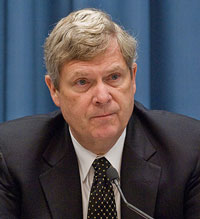 As part of the Obama Administration’s effort to promote production of fuel from renewable sources, create jobs and mitigate the effects of climate change, Secretary Tom Vilsack today announced a series of measures during a speech to the National Press Club in Washington.
As part of the Obama Administration’s effort to promote production of fuel from renewable sources, create jobs and mitigate the effects of climate change, Secretary Tom Vilsack today announced a series of measures during a speech to the National Press Club in Washington.
“Domestic production of renewable energy, including biofuels, is a national imperative and that’s why USDA is working to assist in developing a biofuels industry in every corner of the nation,” said Vilsack. “By producing more biofuels in America, we will create jobs, combat global warming, replace our dependence on foreign oil and build a stronger foundation for the 21st century economy.”
The Secretary announced several measures, including the publication of a final rule to implement the Biomass Crop Assistance Program (BCAP). Under the BCAP final rule, USDA will resume making payments to eligible producers. The program had operated as a pilot, pending publication of the final rule. Authorized in the Food, Conservation, and Energy Act of 2008, BCAP is designed to ensure that a sufficiently large base of new, non-food, non-feed biomass crops is established in anticipation of future demand for renewable energy consumption.
 The nation’s largest ethanol producer, POET, welcomed finalization of rules for the Biomass Crop Assistance Program (BCAP), saying it will help launch the biomass market near the site of their planned cellulosic ethanol plant. “The 85 farmers we have contracted with to deliver 56,000 tons of biomass this fall are nearly finished harvesting, so the final BCAP rule comes not a day too soon,” said Jim Sturdevant, Director of Project LIBERTY for POET. “We will now apply for our cellulosic ethanol plant to become an approved Biomass Conversion Facility (BCF) so that local farmers can become eligible for matching payments for the biomass they will soon deliver.”
The nation’s largest ethanol producer, POET, welcomed finalization of rules for the Biomass Crop Assistance Program (BCAP), saying it will help launch the biomass market near the site of their planned cellulosic ethanol plant. “The 85 farmers we have contracted with to deliver 56,000 tons of biomass this fall are nearly finished harvesting, so the final BCAP rule comes not a day too soon,” said Jim Sturdevant, Director of Project LIBERTY for POET. “We will now apply for our cellulosic ethanol plant to become an approved Biomass Conversion Facility (BCF) so that local farmers can become eligible for matching payments for the biomass they will soon deliver.”
POET is in the midst of the world’s largest commercial harvest of biomass for cellulosic ethanol. Farmers around Emmetsburg, Iowa are baling corn cobs and light stover for delivery to POET. In order to store the bales, POET recently completed construction of a multi-million dollar stack yard next to where the first commercial cellulosic ethanol plant will be built.

